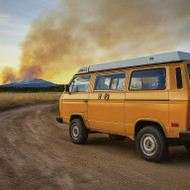Van camping offers unparalleled freedom and adventure, but when your journey leads you to wildfire-prone areas, extra precautions are essential. Wildfires are a real and serious risk in many beautiful regions, particularly during dry seasons or windy conditions. Responsible van camping not only keeps you safe but also helps protect these precious landscapes from devastation. Here's how to enjoy your van camping experience while minimizing the risk of wildfires.
1. Know Before You Go
Stay Informed: Before setting out, check for any fire restrictions or bans in the area you plan to visit. Local government websites, forest service offices, or ranger stations usually provide the latest information on fire conditions and restrictions.
Weather Watch: Keep an eye on the weather forecast. High winds and low humidity can elevate fire risks significantly. Adjust your plans if conditions are unfavorable.
2. Choose Your Campsite Wisely
Stick to Designated Areas: Choose to camp in established campgrounds or designated camping areas. These sites are chosen for their safety and suitability, reducing your risk of inadvertently starting a fire.
Assess the Surroundings: Choose a spot that is clear of dense vegetation and away from tall grass or brush. A site with minimal flammable materials is safer. Don’t park
Don’t Park on Grasses with a Hot Vehicle Exhaust: One common cause of inadvertent wildfires is parking on dry grass after driving. Even if you’re just pulling off the road to grab a bit of lunch or heed the call of nature, your exhaust (and in particular your catalytic converter) can ignite a fire when in contact with dry grass.
Prepare the Site: If the area isn’t pre-cleared, take the initiative to clear away dry leaves, branches, and other combustibles from around your van and campsite.
3. Manage Fire Safety
Use Established Fire Rings: If you are determined to have a campfire, use existing fire rings or fire pits. Avoid creating new fire sites as these can pose a greater risk.
Control Your Flames: Keep your fire small and manageable. A contained fire is easier to monitor and extinguish. Avoid lighting a fire on windy days, as this can increase the risk of sparks spreading.
Never Leave a Fire Unattended: Always keep a close watch on your fire. Even a brief moment of inattention can lead to a serious incident.
4. Extinguish Fires Properly
Douse Thoroughly: When it's time to put out the fire, use plenty of water to fully extinguish the flames and stir the ashes to ensure no embers remain hot.
Check for Heat: After extinguishing the fire, ensure that the ashes are cool to the touch. If water isn’t available, you can cover the fire with dirt and mix thoroughly, but this method is less reliable.
5. Maintain Van and Campsite Safety
Equip Your Van: Keep a fire extinguisher inside your van, and ensure it's properly maintained and easily accessible.
Store Fuels Safely: Store propane tanks and other fuels away from heat sources and direct sunlight. Ensure these are securely fastened and properly ventilated.
6. Follow Local Regulations
Abide by Rules: Always follow local fire regulations and guidelines. In some areas, campfires and open flames may be completely banned during high-risk periods.
Check for Updates: Fire restrictions can change rapidly based on weather conditions. Stay informed and adapt your plans as necessary.
7. Create a Defensible Space
Clear Around Your Van: Create a defensible space by clearing vegetation and debris within a reasonable radius around your van. This can help prevent a fire from reaching your vehicle or campsite.
Regular Maintenance: Keep your campsite clean and free of any combustible materials. Regularly check for and remove any potential fire hazards.
8. Be Prepared for Emergencies
Know Your Exits: Familiarize yourself with the nearest evacuation routes and emergency contacts. Have a plan in place for quick and safe evacuation if needed.
Emergency Kit: Keep an emergency kit ready, including essentials like food, water, and important documents. Ensure all members of your group know the emergency procedures.
9. Leave No Trace
Pack Out Trash: Dispose of all waste properly. Trash and food scraps can attract animals and increase the risk of wildfires.
Clean Up Thoroughly: Leave your campsite in the same condition you found it, or better. This includes making sure all fires are fully extinguished and all waste is packed out.
10. Educate and Advocate
Share Knowledge: Spread the word about fire safety and responsible camping practices among fellow campers.
Support Fire Safety Initiatives: Advocate for and support local fire safety initiatives and community efforts to prevent wildfires.
Van camping in wildfire-prone areas can be a rewarding experience if approached with caution and responsibility. By staying informed, managing fire risks, and following safety guidelines, you can enjoy the great outdoors while helping to protect it. Here’s to many safe and memorable camping adventures! ???

